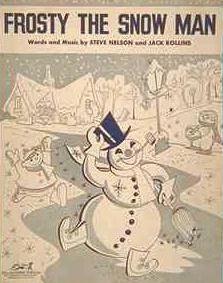
















Santa, Rudolph, and Frosty
Copyright © December 5, 2016 by Robert Wayne Atkins, P.E.
All Rights Reserved.


 During the December holiday season in the United States of America we are bombarded with information about Santa Claus, Rudolph the Red-Nosed Reindeer, and Frosty the Snow Man. These imaginary characters appear in advertisements, in our music, in an overwhelming number of movies, on gift wrapping paper, as figurines and stuffed toys, and sometimes in real life when a person puts on a costume and claims to be Santa. However, all of these characters are fictional, just like Tinkerbell, and Dora the Explorer, and Barney the purple dinosaur. In my opinion there is nothing wrong with make-believe characters. Some of them have been around for thousands of years, such as in the Fables of Aesop. As long as these characters are kept in the realm of "imaginary fairy tale characters" then they can be entertaining.
During the December holiday season in the United States of America we are bombarded with information about Santa Claus, Rudolph the Red-Nosed Reindeer, and Frosty the Snow Man. These imaginary characters appear in advertisements, in our music, in an overwhelming number of movies, on gift wrapping paper, as figurines and stuffed toys, and sometimes in real life when a person puts on a costume and claims to be Santa. However, all of these characters are fictional, just like Tinkerbell, and Dora the Explorer, and Barney the purple dinosaur. In my opinion there is nothing wrong with make-believe characters. Some of them have been around for thousands of years, such as in the Fables of Aesop. As long as these characters are kept in the realm of "imaginary fairy tale characters" then they can be entertaining.
However, when these characters are brought out of the "fairy tale" story and a person claims that these characters are real then that person is telling a lie. People can come up with a multitude of reasons why it is okay to tell a lie. But a lie is still a lie. Anyone who tells a lie is intentionally deceiving other people and that person is destroying their long-term credibility.
The story of Santa Claus is based on the Christian Bishop Saint Nicholas who was a real person and he lived many years ago but he died on December 6, 343 AD. When he died he did not transcend into Santa Claus. He just died and his life ended. He is not alive today at the North Pole making gifts for little children.
If we tell our children lies when they are young then they will eventually discover the truth as they get older and this will cause them to have sub-conscious doubts for the rest of their lives about the truth of everything we tell them. When we give them critically important advice later in their lives then they will make their own decision on whether or not to follow our advice because they may suspect that we may not be telling them the full truth, or that we have some hidden agenda that we are not revealing to them.
In my opinion there is nothing wrong with fairy tales and make-believe characters as long as we carefully explain to our children the difference between the truth and a fairy tale.
When my children were growing up I told them that Jesus was real but that Santa, Rudolph, and Frosty the Snow Man were all just fairy tale characters. I explained to my children that all parents have the right to tell their own children what is true and what is a fairy tale. I told my children that they should not argue with other children about whether or not Santa was real and that they should let other children believe whatever their parents told them. In summary, I told my children to simply say that they did not wish to discuss whether or not Santa was real if they were asked this question by their friends.
The decision on what you tell your children is always up to you. I sincerely pray that you give this issue the serious thought that it deserves and that you make the best choice for the long-term happiness of your entire family.
Footnote for Christians
The above comments were written for anyone who desires to be an honest, truthful person, regardless of whether or not they are a Christian.
However, the comments in this footnote apply primarily to Christians who wish to strengthen their witness as a Bible believing Christian.
It is extremely important for Christians to tell their children the difference between the truth and a fairy tale. Although nobody knows the exact day that Jesus was born, our forefathers decided to celebrate and honor Jesus' birth on December 25th. A Christian should make sure that his or her family celebrates December 25th as Jesus' birthday and that his or her family knows that Jesus' birthday is the real reason we give presents to one another. Our children should not be lied to and told that an imaginary Santa brings gifts into their house on Christmas Eve during the night. If our children are told a lie about Santa then how will our children respond to the gospel message of Jesus Christ later in life? Will they take it seriously or will they sub-consciously put it into the same category as Santa, the Easter Bunny, and the Tooth Fairy?
 If you are a Christian and if you decorate your home during the Christmas season then do you display a nativity scene? Do you also display a Santa figurine or display Santa's sled and some flying reindeer? If you display a nativity scene and some type of Santa decorations then what message are you broadcasting to everyone who sees your decorations? Would other people, especially non-Christians, think that you put Jesus and Santa in the same mythical category? Would other people be inclined to take you seriously if you tried to tell them about your faith in Jesus Christ? If you are sending mixed messages during the Christmas season then your effectiveness as a Christian witness will probably suffer the entire year.
If you are a Christian and if you decorate your home during the Christmas season then do you display a nativity scene? Do you also display a Santa figurine or display Santa's sled and some flying reindeer? If you display a nativity scene and some type of Santa decorations then what message are you broadcasting to everyone who sees your decorations? Would other people, especially non-Christians, think that you put Jesus and Santa in the same mythical category? Would other people be inclined to take you seriously if you tried to tell them about your faith in Jesus Christ? If you are sending mixed messages during the Christmas season then your effectiveness as a Christian witness will probably suffer the entire year.
When my children were young and I was buying gift wrapping paper for Christmas gifts I usually bought the assortment package that contained a variety of different printed designs. It was almost impossible to find a variety pack that did not have at least one roll of wrapping paper with Santa on it. That did not stop me from buying the very affordable assortment of wrapping paper. However, when I arrived home I immediately removed the Santa wrapping paper from the package and put it in the trashcan. I never used any type of Santa wrapping paper on the gifts that I put under our Christmas tree because I did not want to transmit a mixed message to my family or to anyone who might come to visit us during the Christmas season.
When my children were young I did not object to my children listening to a wide variety of Christmas music even though I knew that the radio station would occasionally play a Santa song. I had faith that my children understood that the Santa song was about a make-believe character and that there was no truth in the lyrics. On the other hand, when I played Christmas music in our home I never played any Santa songs. I played an assortment of Christmas hymns along with a variety of generic Christmas music such as "White Christmas" and "Deck the Halls" and "I'll Be Home for Christmas" and "Jingle Bells."
For the past forty years I have always sent Christmas cards every year to my extended family members and my friends. The Christmas cards I sent each year always had some type of nativity scene on the card along with some type of gospel message and at least one scripture verse. I did this intentionally every year because this was the one time each year when I could gracefully witness to others without seriously offending them. On the other hand, I almost always received Christmas cards from these same people each year and the cards they sent my family rarely mentioned Jesus and most of the time those cards just had some pretty winter picture on it along with a generic holiday message inside the card. Sometimes the card was designed around a picture of their family members. There is absolutely nothing wrong with these generic Christmas cards. But if you are a Christian then Christmas is your one opportunity each year to witness to the ones you love without seriously offending them. I realize that Christmas cards cost money and that the postage is also an expense but this small amount of money is truly a worthwhile investment because it may lead the people you love into an eternal relationship with the one and only Son of the everlasting Father.
Today is December 5, 2016 and in the area where I live a few of the stores and restaurants are displaying nativity scenes on their windows along with brief scripture verses, such as "Peace on Earth." It has been many years since any business has had the courage to do this and this absolutely delights me. I only wish that more businesses would decorate their windows with nativity scenes the way they did in the 1950s and the 1960s.
(Note: In the United States of America nobody complains that we celebrate Martin Luther King, Jr.'s birthday on the third Monday in January of each year, even though he was born on January 15, 1929 and January 15 does not always fall on the third Monday of January. It would be nice if people would stop complaining that December 25th is not really Jesus' birthday and simply accept that date as being the day we have chosen to honor the birth of Christ.)
Respectfully,
Grandpappy.
Grandpappy's e-mail address is: RobertWayneAtkins@hotmail.com






































 During the December holiday season in the United States of America we are bombarded with information about Santa Claus, Rudolph the Red-Nosed Reindeer, and Frosty the Snow Man. These imaginary characters appear in advertisements, in our music, in an overwhelming number of movies, on gift wrapping paper, as figurines and stuffed toys, and sometimes in real life when a person puts on a costume and claims to be Santa. However, all of these characters are fictional, just like Tinkerbell, and Dora the Explorer, and Barney the purple dinosaur. In my opinion there is nothing wrong with make-believe characters. Some of them have been around for thousands of years, such as in the Fables of Aesop. As long as these characters are kept in the realm of "imaginary fairy tale characters" then they can be entertaining.
During the December holiday season in the United States of America we are bombarded with information about Santa Claus, Rudolph the Red-Nosed Reindeer, and Frosty the Snow Man. These imaginary characters appear in advertisements, in our music, in an overwhelming number of movies, on gift wrapping paper, as figurines and stuffed toys, and sometimes in real life when a person puts on a costume and claims to be Santa. However, all of these characters are fictional, just like Tinkerbell, and Dora the Explorer, and Barney the purple dinosaur. In my opinion there is nothing wrong with make-believe characters. Some of them have been around for thousands of years, such as in the Fables of Aesop. As long as these characters are kept in the realm of "imaginary fairy tale characters" then they can be entertaining. If you are a Christian and if you decorate your home during the Christmas season then do you display a nativity scene? Do you also display a Santa figurine or display Santa's sled and some flying reindeer? If you display a nativity scene and some type of Santa decorations then what message are you broadcasting to everyone who sees your decorations? Would other people, especially non-Christians, think that you put Jesus and Santa in the same mythical category? Would other people be inclined to take you seriously if you tried to tell them about your faith in Jesus Christ? If you are sending mixed messages during the Christmas season then your effectiveness as a Christian witness will probably suffer the entire year.
If you are a Christian and if you decorate your home during the Christmas season then do you display a nativity scene? Do you also display a Santa figurine or display Santa's sled and some flying reindeer? If you display a nativity scene and some type of Santa decorations then what message are you broadcasting to everyone who sees your decorations? Would other people, especially non-Christians, think that you put Jesus and Santa in the same mythical category? Would other people be inclined to take you seriously if you tried to tell them about your faith in Jesus Christ? If you are sending mixed messages during the Christmas season then your effectiveness as a Christian witness will probably suffer the entire year.
